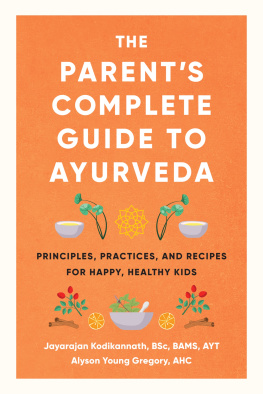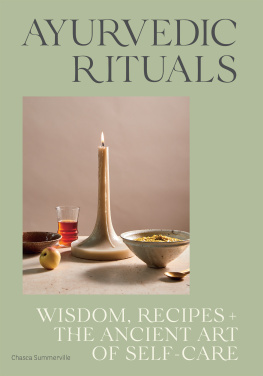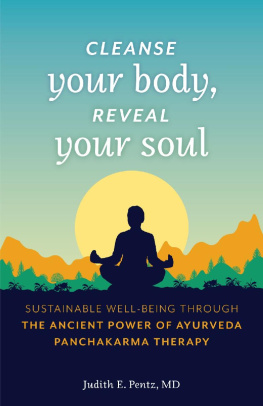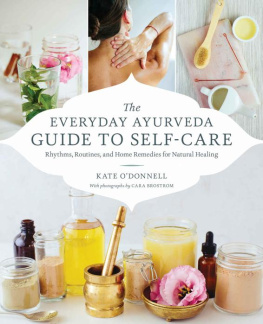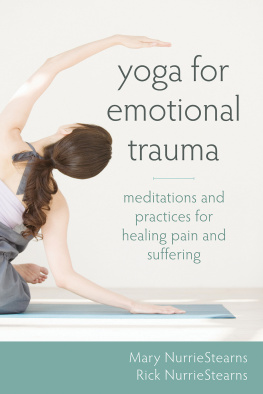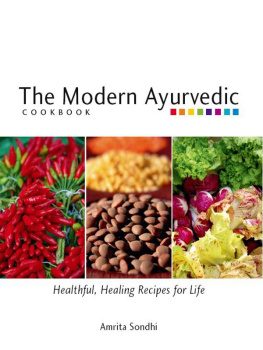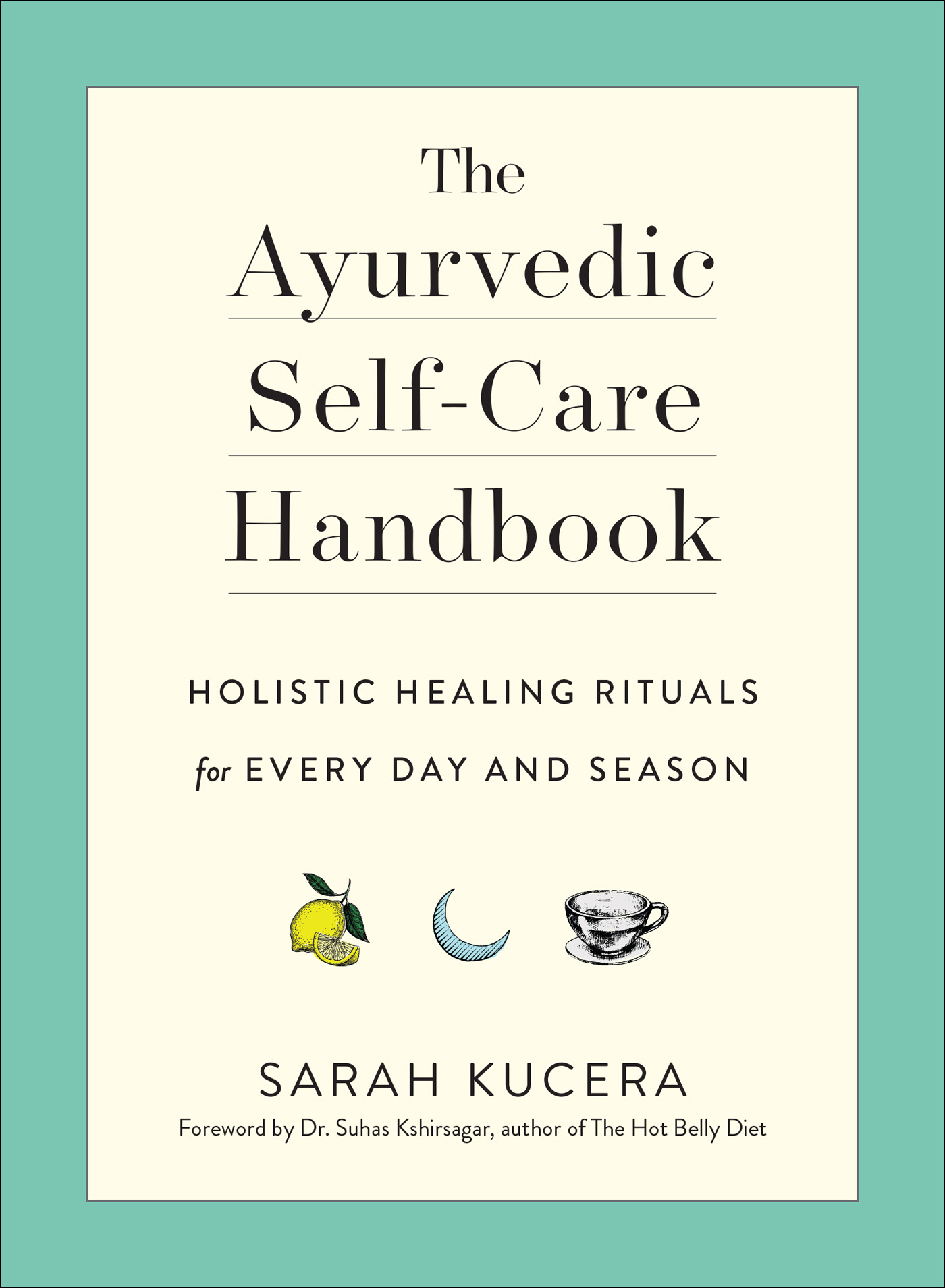
The
Ayurvedic Self-Care Handbook
Holistic Healing Rituals for Every Day and Season
SARAH KUCERA, DC, CAP
Foreword by Dr. Suhas Kshirsagar, BAMS, MD

This book is dedicated to all of my patients and students. Whether it was one class or appointment, or many throughout the years, you have trusted me to be your guide. As I have been your teacher, you have also been mine.
I am so thankful for you.
Foreword
by Dr. Suhas Kshirsagar
The Ayurvedic Self-Care Handbook is a perfect template to take control of your health and well-being. All the latest medical research converges upon evidence that a plant-based diet, sleep, exercise, meditation, and effective stress management are the keys for everyday health. There is no better template than Ayurvedic medicine to integrate these modalities. In fact, Ayurveda is the art and science of longevity.
We are at a crossroads in medicine where we need to regain our understanding of the true meaning of prevention, which means we must participate in our own health and make responsible choices. All the ancient cultures understood the importance of self-care rituals that were perfectly aligned with the phases of moon, changing seasons, festivals, and community living. Healthy living was a way of life, and social well-being was based upon sustainable living.
The latest science of chronobiology supports this ancient wisdom, clearly revealing that time is embedded in our genes. The timing of eating, sleep, and exercise are all very important to how we digest the world around us (not just food), which translates into our physical, emotional, and spiritual health. This emerging Western research is exciting, but it also validates the ancient Ayurvedic principles of daily, nightly, and seasonal routines for people in various phases of life, which Ive explored throughout my work and writings.
The book in your hands is paramount for promoting self-love and self-responsibility in todays modern age. Sarah Kucera is a good friend and colleague who is at the forefront of sharing these concepts with her clients and students alike. A chiropractor by training, she is combining this science of the body with her deeply intuitive yogic and Ayurvedic perspectives, to identify and correct the root imbalance causing disease, and to empower people in owning their health. Ayurveda and yoga are sister sciences that empower us to lead a spiritual life free from diseases. Their prescriptions are not quite what most of us are used to, however; this ancient systems medicine involves simple forms of self-caresuch as daily oil massage, morning walks, herbal teas, spices, and healing foodsall of which not only prevent the imbalances that cause disease, but also improve the overall quality and quantity of our lives.
Although self-care is growing in popularity, its largely been a completely foreign concept in the West. As industry and the economy advance, we have become conditioned to yearn, struggle, and strive for more, and to continuously work hard. Many individuals in the workforceespecially millennialsfear being away from the office, forgetting about vacations and paid time off. The majority of my patients struggle with these concerns, battling disappointment, burnout, and depression that affects their work and personal lives. Needless to say, this puts tremendous pressure on their families and all the relationships they engage in, perpetuating unhealthy work-life balance and the neglect of self-care. We cannot love others if we dont love ourselves first.
Everyone shares a natural desire to be happythe purpose of life itself is simply the expansion of happiness. Most people, however, seek happiness from external sources. At a certain point, we learn that happiness is a state of being rather than something that is acquired. You cannot choose what you experience in everyday life, whether a traffic jam or a rainbow. But you can choose to cultivate an attitude of looking at the brighter side of things, and not to ingest the toxicity of any experience. This practice alone will set up the conditions for a truly sattvicor balanced and joyfulstate; a state that relies on self-love as the source of happiness.
Self-love can be defined as the act of valuing ones own happiness and well-being. It is a kind of acceptance, or unconditional support and caring. And it is at the core of compassion for self-healing. It requires commitment to oneself, as well as willingness to identify and to meet personal needs, to allow non-judgmental thinking, and to view the self as essentially worthy, good, valuable, and deserving of health and happiness. All from deep within ourselves, not the outside.
As Sarah clearly and thoroughly outlines in this heartfelt book, the easiest way to do this according to Ayurvedic philosophy is through aligning with nature. Natural biorhythms are constantly affecting our mind and body, and so conscious efforts to follow daily as well as seasonal routines will help us prevent imbalance. Building from there, if you can balance your day, you will soon be able to balance your thoughts and listen to your body. And with that, you can change your life.
The real reason for self-care and self-love, however, isnt as selfish as it may sound. We are trying to discover balance for greater harmony inside and outside ourselves. When we are healthyphysically, mentally, and emotionallyour state of well-being spills out to everyone in our lives. As we learn self-acceptance, self-forgiveness, and self-compassion, we become more empathetic and tolerant of humanity. The way we treat ourselves also sends a powerful message to our friends, family, and even the general population, about how we accept being treated. If we are consistently putting ourselves last, we should not be surprised when others do the sameand yet, when others become dismissive and disrespectful, we are hurt profoundly, taking it personally, feeling like a victim in the system that we perpetuate by our own unconscious behavior.
Sarah does a phenomenal job outlining many different forms of self-love, providing the most comprehensive guide for well-being. Grounded in her own experience, she has made it her personal mission to share the necessity of self-love and self-care as a cornerstone of happiness and, indeed, optimum health. Whether you incorporate just one of the rituals in these pages, or find yourself rescheduling your entire life, by picking up this book youre already on your way to a more balanced, aligned, and awake version of yourselfand to learning to love and care for yourself in a new, radiant light.
Dr. Suhas Kshirsagar, BAMS, MD (Ayurveda), is a world-renowned Ayurvedic physician and educator from India, and the director of the Ayurvedic Healing and Integrative Wellness Clinic in northern California. He is the author of The Hot Belly Diet and Change Your Schedule, Change Your Life.
Introduction
The Nature of Medicine
W henever Im struggling with feeling less than my best, I think back to when I was healthiest and happiestan exercise I recommend we all do on occasion. Without hesitation my mind goes back to my childhood, around age nine to be precise. I grew up in small-town Iowa, where I ate home-cooked meals bursting with the flavors of my mothers garden or my grandparents farm; I had the freedom to fearlessly play outside, biking in the summer and sledding in the winter; my and my older sisters days followed a solid routine that was undoubtedly shaped by my moms desire to raise healthy and happy children. After all, that was how she was raised herself. As one of five children growing up in a small farmhouse, she was given a schedule of daily chores, but also an abundance of nurturing from her own mother. Her days had predictability, and so mine did, too. I can remember not only how my nine-year-old days opened and closed, but also the feeling of safety my routine provided.
Next page

